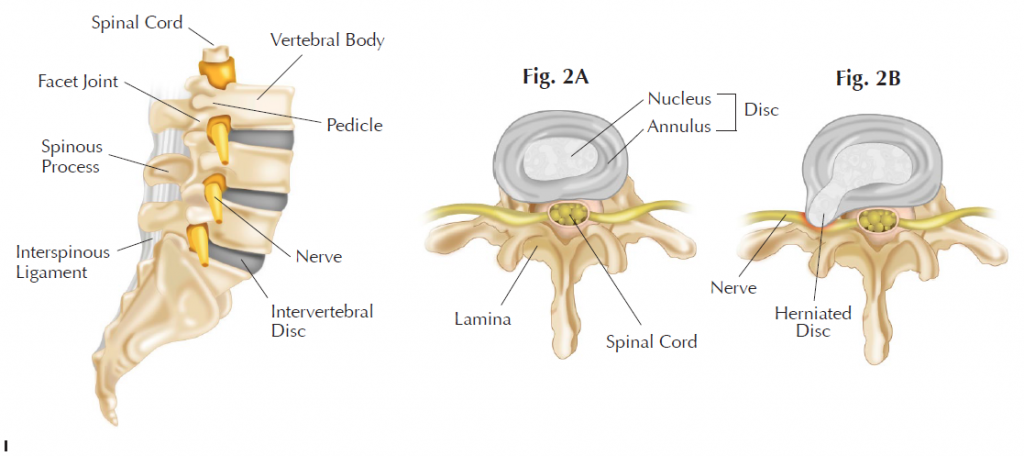A lumbar slipped disc refers to a herniated disc. It occurs when the gel-like nucleus inside these discs shifts from its place, leading to tears, ruptures, and bulging. You might feel pain, numbness, and fatigue in the affected area (low back and lower limbs), especially when the exposed nucleus pulposus comes in contact with your nerves. In turn, this leads to mobility issues, poor coordination, and inability to perform everyday activities, in turn, making it crucial to seek lumbar slipped disc treatment.
Overview: Lumbar Slipped Disc
A lumbar slipped disc (or herniated disc) affects one (or more) spinal discs. These discs have gel-like centers (nucleus pulposus) and tough, rubbery exteriors.
The spine consists of multiple discs stacked between the vertebrae. These discs create a cushioning effect to minimize friction and improve stable movements.
Sometimes spontaneous movements, degenerative issues, or overuse of the lumbar region place undue pressure on the disc. It can cause the nucleus to bulge or rupture because of a tear in the disc wall. This leads to low back pain, which radiates towards the lower limbs and foot as the condition worsens.

You may feel excruciating pain when you move, depending on the location of your herniated disc. The muscles surrounding this area begin to weaken, leading to numbness. As the conditions worsen, you might experience a reduced range of motion, fatigue, and impaired reflexes.
Early physical therapy for slipped disc intervention mitigates long-term risks and restores mobility, limiting further disc degeneration.
Lumbar Slipped Disc Symptoms
The common lumbar slipped disc symptoms include:
- Localized pain depending on the location of your herniated disc
- Low back pain, which can spread to lower limbs and the feet (might escalate when you move)
- A numbness or tingling sensation felt in the affected area
- Weak muscles and loss of reflexes
- Inability to lift/carry heavy objects
- Difficulty in movement and reduced range of motion
- Poor coordination
- It might affect regular bowel movement and bladder functions
Causes
General causes of a lumbar slipped disc include:
- Spinal injury as a result of sudden movement, collision, or car accident
- Degenerative issues that increase as you grow older
- Genetics
- Occupational activities that cause premature disc degeneration due to excessive wear and tear of the lumbar region (i.e. manual labor, improper posture for prolonged periods, or heavy lifting)
- High-impact recreational and sports activities
Our physical therapists will take a complete physical assessment before treatment. We discuss medical history and family records along with daily activities. These help us determine the cause of your low back pain, leg pain, and associated symptoms.
Slipped Disc Diagnosis
Additionally, we discuss spinal injuries (old and new) that might affect your current condition. That way, we can rule out other probable causes.
Our physical therapists are trained to assess your movement, gait, and balance. We will request you to walk, stand, and sit to observe how the lumbar slipped disc affects optimal functioning. We use these assessments to develop a customized slipped disc physical therapy plan that aligns with the severity of your condition.
Lumbar Slipped Disc Treatment
Our personalized physical therapy program covers stretching exercises to improve muscle flexibility and restore the full range of motion. We combine these sessions with core strengthening techniques and aerobic exercises to maximize natural stamina and endurance. These at-home exercises alleviate low back pain and associated symptoms.
These techniques are accompanied by physical therapy techniques like soft tissue massage, joint mobilizations, and electrical muscle stimulation. We use the advanced Neubie NeuFit System to optimize recovery and rehabilitation. It helps activate muscles and promote healthy neural functions to support healing and increase strength.
Moreover, we recommend postural realignment training and functional training. Here you receive practical advice on how to perform everyday tasks ergonomically. For instance, we can demonstrate how you can maintain a proper sitting and standing position to prevent unwanted strain on the affected area, amongst other things. Athletes are introduced to similar techniques adapted according to the sports they play.
Our holistic lumbar slipped disc treatment programs protect your spine and mitigate potential challenges. These include the risk of relapse or development of chronic back pain. We also aim to support a smoother transition to daily activities and hobbies.
Are you looking for more information? Contact us or call @ 201-773-8851 to book an appointment for lumbar slipped disc treatment.

